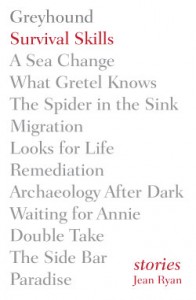Book Review
A greyhound refuse s to run. The dog—bred for explosive speed and vicious grace—instead limps and cowers through the opening pages of Jean Ryan’s debut story collection, Survival Skills. Two women who have rescued the dog see it as a way to heal their own lives. They beg the dog to sprint, to dash, as evidence of its new freedom. But running is too much like its enslaved former life. When the animal finally bolts—“racing without reason,” Ryan writes, “her body in full ecstatic stretch above the ground”—the greyhound signals the central dilemma in Ryan’s stories. Her characters face lives suddenly altered and must decide in what manner they should endure—to slink away, or fly headlong into a frightening, lonely void.
s to run. The dog—bred for explosive speed and vicious grace—instead limps and cowers through the opening pages of Jean Ryan’s debut story collection, Survival Skills. Two women who have rescued the dog see it as a way to heal their own lives. They beg the dog to sprint, to dash, as evidence of its new freedom. But running is too much like its enslaved former life. When the animal finally bolts—“racing without reason,” Ryan writes, “her body in full ecstatic stretch above the ground”—the greyhound signals the central dilemma in Ryan’s stories. Her characters face lives suddenly altered and must decide in what manner they should endure—to slink away, or fly headlong into a frightening, lonely void.
Ryan’s protagonists often are not the primary actors in their narratives. Things happen to them: breakups, accidents, abandonment. These women could easily slouch off as victims, but instead they draw closer to their pain, as if to inspect the clockworks of trauma. The characters reveal themselves not so much through their actions but by how they process a world slipping beyond their control. They begin to desire transformation and a new identity, but in their efforts to remake themselves, they often inflict unanticipated damage. In “Looks for Life,” for instance, a woman undergoes cosmetic surgery so effective that it frees her in unforeseen and destructive ways. In “Migration,” a newly divorced woman wounds her father when she decides not to return to her family name but christens herself with one of her own choosing.
Survival Skills uses the natural world to amplify its characters’ reflections on their longings, fears and losses. The narrator of the title story declares that she wants to come back in her next life as a plant—not a ponderous tree like a sequoia, but a sunflower, which delivers a swift burst of color with a relatively quick “grand finale… Half a year on earth and not a single wasted moment.” In “The Spider in the Sink,” a husband chases tornados just for fun. His wife is left behind to tremble in the electrified air and imagine terrifying winds ripping the world apart. She fears she will lose her husband—possibly to the storm, yes, but more likely to his lack of passion for her now that “age has begun its slow ambush.”
Ryan’s stories also serve up a menagerie that includes a distressed spider, emotionally needy waterfowl, and empathic octopi. Her characters invest these animals with human traits and consciousness. These creatures, of course, act as they would regardless of the anxious people around them. For Ryan’s characters, however, the animals become confidants, betrayers, and moralists.
In “What Gretel Knows,” an unfaithful wife must confront her guilt after sneaking home from a tryst only to discover that her beagle is aware of her infidelity. In “Paradise,” a woman tries to woo a nasty parrot, who responds to her overtures by biting her finger. She had hoped winning over the parrot would impress its owner, a woman with whom she is infatuated. How she describes the parrot’s glare reveals that its strike is less painful than her fear of not being loved in return:
For a long moment I looked into his eye, a thin brown circle around an orange iris, and, inside that, the wet bead of his pupil, the blackest point on earth, the absolute end of everything. I was doomed.
The parrot—with uncanny mimicry of an overheard voice—later provides the clue that proves her fears to be correct.
The divorced woman in “Migration” is shattered by the accidental eavesdropping of “the things others are supposed to keep secret”: her husband is cheating, a close friend considers her annoying, and her son sees her as pitiful. Later, a Canada goose becomes infatuated with her. She recognizes, bitterly, that the bird’s strange love for her is a love her husband could not maintain. The woman worries that the goose will not leave her to migrate, thus leaving it unprepared for winter.
She wanted to offer some warning, some heads up, but she supposed that in its hollow bones, the bird already knew, would always be ready. There were countless mysteries, observed or missed, unfolding every instant. In this tiny pocket of the universe, a goose had a crush on her—she could live with that. And when the snows came and her bird flew away, she would live with that, too.
She soon understands—as do Ryan’s other disappointed, confounded, or bruised characters—we possess the survival skills we need, if only we allow our better instincts to rule our hearts.
About the Reviewer
Brent Walth is an Oregon journalist, author and editor who earned his MFA from Warren Wilson College.